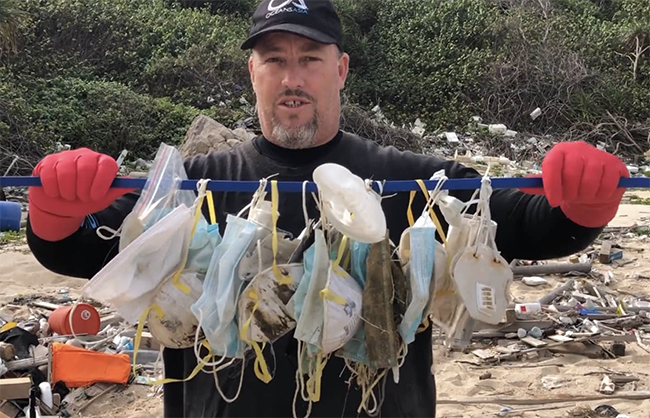Responding to a shortage of melt-blown nonwovens in Europe, RadiciGroup has invested €15 million in a production line for the materials used in surgical mask filters. Meanwhile, environmental groups decry an abundance of disposable face masks polluting the oceans.
January 11, 2021

As the pandemic soars to new heights even as vaccines roll out in many countries to varying degrees of success, demand for face masks is not expected to ebb any time soon. That is evidenced by the just-published Thomas Index Report, which reveals that "face masks" was the most sourced category in its directory during the last quarter of 2020.
To help meet demand in the new year, the Radici Group in Bergamo, Italy, reported today that it has made a “sizable investment” in a new line to produce melt-blown nonwoven materials for face masks and other personal protective equipment.
Amid this heightened industrial activity, however, some environmental activists are warning that “masks are the new plastics menace,” to quote a headline that popped up in my newsfeed today.
And then there is the truly bizarre phenomenon of mask wearing as a proxy for some kind of political statement.
Clearly, there’s a lot to unpack here.
Searching for face masks.
The century-old industrial sourcing platform Thomas today released its list of the top five products by sourcing activity volume in Q4 2020 at Thomasnet.com. Face masks was the number-one category, followed by nitrile gloves and hand sanitizers. These product categories were at the top of the list for almost all of 2020, added Thomas. Face masks, it noted, saw the “biggest increase in sourcing activity in Q4 2020 over Q4 2019. Just like last quarter, face masks are at the top of the list, up 38,239% over last year’s sourcing figures.”
RadiciGroup addresses scarcity of surgical mask filtration materials.
Since the pandemic began its march across the globe early last year, plastics processors have exponentially ramped up production of PPE and associated materials and components. Early on, RadiciGroup said that it had set up a “production chain involving local factories for the manufacture of spunbond nonwovens for medical gowns and other personal protective equipment.” During that time, it said that it had received multiple requests for melt-blown nonwoven materials that are used in the manufacture of surgical mask filters. It’s a type of nonwoven that “is not readily available in the Italian market “ and is produced in small quantities throughout Europe, RadiciGroup said in a press release. It has now invested €15 million to install a melt-blown nonwoven production line at its Gandino, Italy, facility.
The technologically advanced line “has a high production capacity and can also realize products with special technical characteristics, not only made of polypropylene, but also other polymers, such as polyester, polyamide, and TPU,” said RadiciGroup in its announcement. The line is currently being installed.
And the environment in all of this?
A report published in December 2020 by marine conservation group OceansAsia predicts that some 1.5 billion masks will have entered the oceans in 2020. Amounting to between 4,680 and 6,240 metric tonnes of plastic pollution, the “masks will take as long as 450 years to break down and all the while serve as a source of micro plastic and negatively impact marine wildlife and ecosystems,” said the executive summary of the report.
|
Surgical masks that washed up on the shoreline of islands near Hong Kong. They were discovered by Gary Stokes of OceansAsia during a survey trip. Image courtesy OceansAsia. |
While the report asks governments to implement policies to “encourage the use of reusable masks” and educate the public on safe mask disposal practices, OceansAsia stresses on its website that it is not advocating that people should not wear a mask. “If you do not have a reusable mask available or if one is not appropriate in your situation, then by all means use a single-use product. Just ensure that this mask is disposed of properly.”
Or, as intrepid PlasticsToday contributing editor Clare Goldsberry likes to say, pollution is not a plastic problem — it’s a people problem.
One group that won’t be contributing to the proliferation of discarded face masks on land or sea are the anti-maskers. Primarily a US phenomenon, these self-described patriots have stormed grocery stores and shopping malls in recent weeks, harassing store employees and shoppers wearing masks.
While a Venn diagram might show some overlap between environmental activists and people who view mandatory wearing of masks as an infringement on their liberty, the confluence is strangely counter-intuitive. Then again, we are living in strange times.
About the Author(s)
You May Also Like





